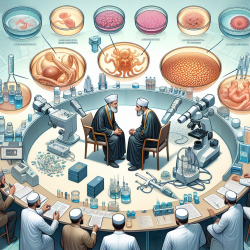Introduction
The intersection of religion, science, and technology presents unique challenges and opportunities in the field of reproductive health. The research paper "Making Muslim Babies: IVF and Gamete Donation in Sunni versus Shi’a Islam" by Marcia C. Inhorn explores these dynamics within the context of Islamic beliefs and practices. This blog post aims to help practitioners enhance their skills by understanding the implications of this research and encouraging further exploration into the cultural and religious dimensions of reproductive technologies.
Key Findings from the Research
The research highlights significant differences in the acceptance and practice of in vitro fertilization (IVF) and gamete donation between Sunni and Shi’a Muslims. These differences are rooted in religious interpretations and fatwas, which are non-binding but authoritative Islamic religious proclamations.
- Sunni Islam: Generally prohibits third-party gamete donation, considering it akin to adultery (zina). The emphasis is on maintaining the purity of lineage and avoiding any confusion in genealogy.
- Shi’a Islam: More permissive under certain conditions, allowing gamete donation with specific religious and legal stipulations. This is largely due to the fatwa issued by Ayatollah Khamanei, which permits donor technologies under controlled circumstances.
Implications for Practitioners
For practitioners working with Muslim populations, understanding these religious nuances is crucial. Here are some ways practitioners can improve their skills and approach:
- Cultural Sensitivity: Be aware of the religious beliefs and practices of your patients. This knowledge will help you provide care that respects their values and beliefs.
- Patient Education: Educate patients about the available reproductive technologies and how they align with or diverge from their religious beliefs. This can empower them to make informed decisions.
- Collaboration with Religious Leaders: Engage with local religious leaders to understand their perspectives and gain insights into how religious teachings can be integrated into reproductive health care.
- Encourage Further Research: The field of medical anthropology offers valuable insights into the cultural dimensions of reproductive technologies. Encourage further research to better understand the evolving practices and beliefs in different communities.
Conclusion
The research by Marcia C. Inhorn provides a comprehensive look at how IVF and gamete donation are perceived and practiced within Sunni and Shi’a Islam. For practitioners, this knowledge is invaluable in delivering culturally competent care and supporting patients in making decisions that align with their religious and moral values.
To read the original research paper, please follow this link: Making Muslim Babies: IVF and Gamete Donation in Sunni versus Shi’a Islam.










